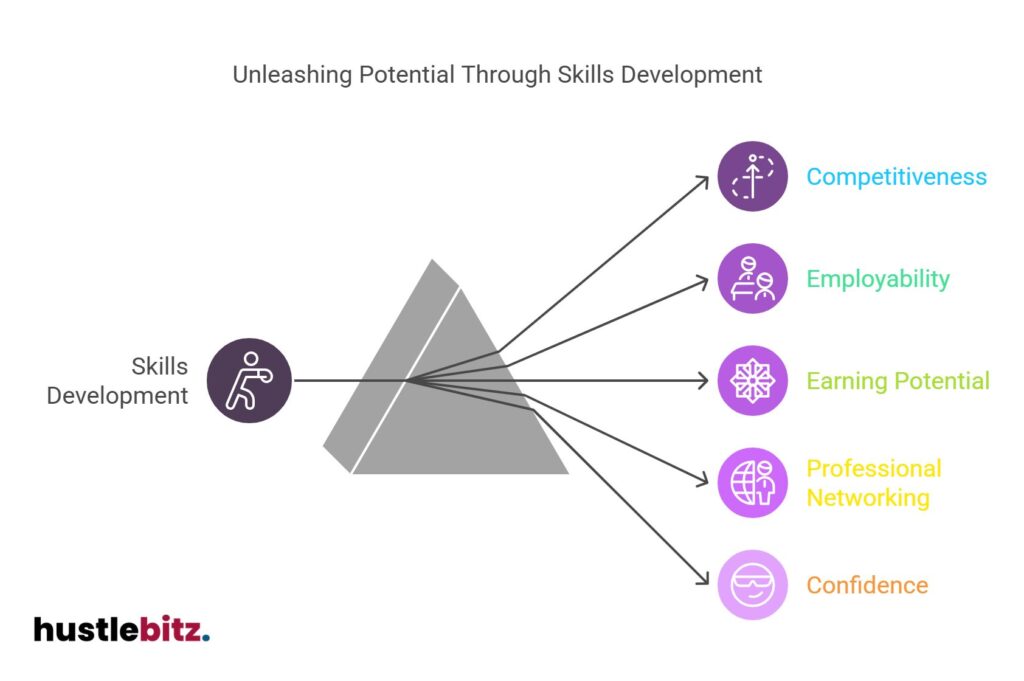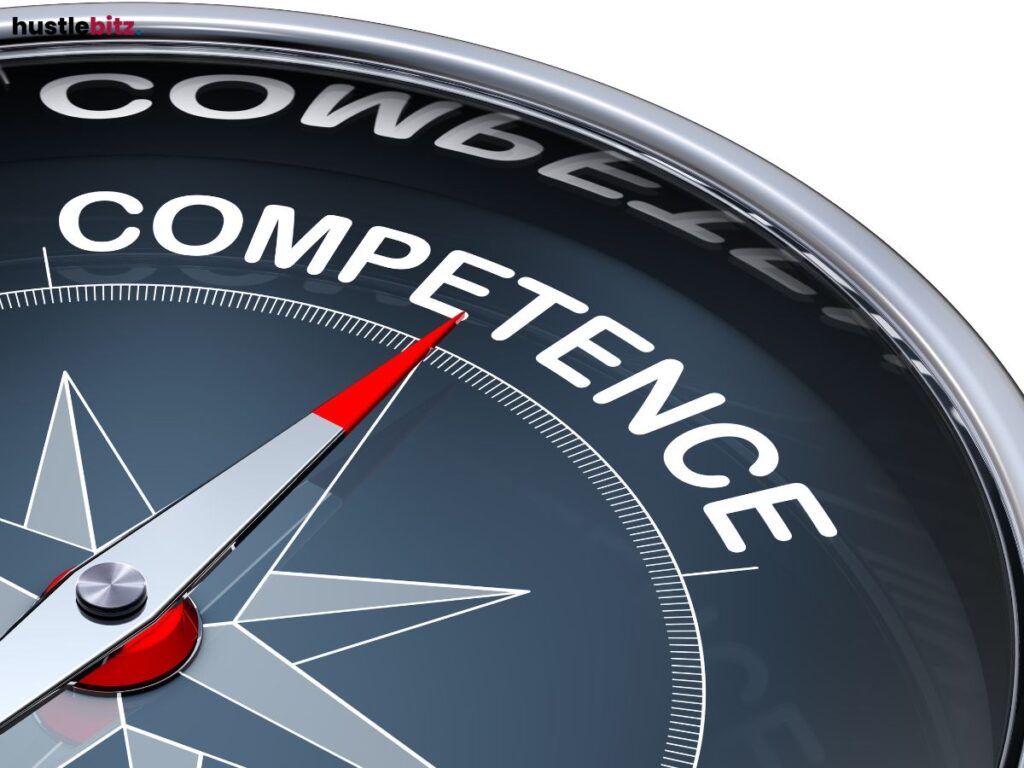Skills development is essential for career growth as it ensures that individual capabilities are in sync with the ever-changing demands of the job market. As industries undergo rapid transformation driven by technological advancements and globalization, continuous learning becomes vital in enhancing employability and adaptability. By participating in workshops, earning certifications, and mastering new skills, professionals not only increase their earning potential but also gain the confidence needed to pursue advanced career opportunities. Moreover, the mastery of relevant skills fosters the development of meaningful professional relationships, further opening pathways for career progression. Keeping skills up-to-date allows individuals to remain competitive and well-prepared for emerging challenges, laying the groundwork for sustained success in their chosen fields.
Key Takeaways
- Skills development is key to adapting to the rapidly evolving job market, ensuring competitiveness in the face of technological advancements and globalization.
- Continuous learning boosts employability by equipping professionals with the hard and soft skills that employers value most.
- Acquiring new skills can lead to significant increases in earning potential and better positioning for promotions and salary enhancements.
- Building a strong professional network through skill development creates opportunities for career advancement and growth.
- Ongoing skill enhancement builds confidence and competence, empowering professionals to navigate workplace challenges effectively.

Evolving Job Market

In today’s rapidly evolving job market, professionals must continuously adapt to emerging trends and technologies to remain competitive and relevant. The dynamics of this market are shaped by various factors, including globalization, technological advancements, and shifting workforce expectations. As these elements converge, they necessitate a proactive approach to professional development, ensuring individuals possess the skills for career growth that align with current demands.
To achieve career advancement in such an environment, professionals must engage in continuous learning. This commitment not only helps in acquiring new competencies but also in refining existing ones. For instance, familiarity with digital tools, data analytics, and soft skills such as communication and teamwork are increasingly sought after by employers. These skills enable professionals to navigate the complexities of modern work environments effectively.
Moreover, understanding the evolving job market equips individuals to anticipate changes and prepare accordingly. This foresight allows them to identify potential career paths and areas for improvement, ensuring they remain relevant and valuable to their organizations. In this context, continuous learning becomes not just a strategy for personal development but a necessity for sustaining career momentum.
Enhancing Employability
The ability to enhance employability is increasingly intertwined with the continuous learning and skill development strategies adopted by professionals in a dynamic job market. As industries evolve, the importance of skill development cannot be overstated. Professionals who actively engage in skills development in their careers are better positioned to meet the demands of employers seeking versatile and knowledgeable candidates.
To effectively enhance their skills, individuals must embrace various professional development programs that focus on both hard and soft skills. These programs often include workshops, online courses, and certifications that equip participants with relevant knowledge and abilities tailored to their career goals. By prioritizing skill enhancement, professionals not only expand their current capabilities but also increase their adaptability to changing job requirements.
Furthermore, enhancing employability through skill development opens up a plethora of career opportunities. Employers are increasingly valuing candidates who demonstrate a commitment to lifelong learning and personal growth. Such individuals are often perceived as more competent and motivated, making them attractive prospects in the job market.
Increasing Earning Potential

Acquiring new skills significantly contributes to increasing earning potential, as professionals become more valuable assets to their organizations. In today’s competitive job market, skills are essential for standing out among peers. Employers are increasingly seeking individuals who not only possess relevant experience but also demonstrate a commitment to continuous learning and development. By actively pursuing skills development, professionals position themselves for advancement and greater financial rewards.
Individuals who invest in acquiring new skills often find themselves eligible for promotions, salary increases, and enhanced benefits. This is particularly true in fields where specialization is vital. For instance, professionals in technology, finance, and healthcare are often rewarded for mastering new systems, tools, or methodologies that directly impact their organizations’ efficiency and success. Consequently, this correlation between skills enhancement and higher earning potential is evident.
Moreover, as professionals embark on their journey of career growth, they discover that the acquisition of new skills fosters a sense of confidence and competence. This self-assurance enables them to take on challenging projects and leadership roles, further amplifying their value within their organization. Ultimately, the continuous pursuit of professional development not only contributes to individual career trajectories but also promotes overall organizational success.
Adapting to Technological Changes

Adapting to technological changes is essential for professionals aiming to maintain relevance and competitiveness in an ever-evolving job market. As new technologies emerge, the skills needed to excel in various industries shift dramatically. Professionals who continuously update their technical skills are better positioned to navigate these changes and seize new opportunities.
Staying informed about industry trends is crucial for identifying the skills that will be in demand. This proactive approach not only enhances one’s immediate employability but also contributes to long-term career sustainability. Engaging in ongoing professional development enables individuals to acquire relevant knowledge and competencies, allowing them to adapt to changing paradigms and practices within their fields.
Moreover, developing transferable skills—such as critical thinking, problem-solving, and communication—can significantly bolster a professional’s ability to adjust to new technologies. These skills are invaluable across various roles and sectors, making it easier for individuals to pivot when necessary. As automation and digital tools become more integrated into work processes, possessing a versatile skill set gives professionals a competitive edge.
Expanding Professional Network
Building a robust professional network is essential for career advancement, as it opens doors to new opportunities and fosters valuable connections within one’s industry.
Expanding your professional network not only enhances your visibility but also significantly contributes to your personal and professional growth. Through interactions with peers and mentors, you can gain insights that are pivotal for career success.
Here are four key benefits of expanding your professional network:
- Access to Development Opportunities: Networking allows you to discover workshops, seminars, and training sessions that can help you acquire new skills. Staying updated with industry trends is crucial for remaining competitive.
- Support System: A well-connected network provides a support system in times of career challenges. Colleagues and mentors can offer advice, encouragement, and potentially job leads during transitions.
- Knowledge Sharing: Engaging with a diverse range of professionals exposes you to different perspectives and innovations. This exchange of ideas can enhance your understanding of your field and inspire new approaches to your work.
- Increased Visibility: Building relationships within your industry increases your visibility among key decision-makers. Personal connections often lead to referrals, which can be instrumental in achieving career milestones.
Boosting Confidence and Competence

Enhancing confidence and competence is crucial for professionals seeking to navigate the complexities of their careers effectively. Skill development plays a pivotal role in this process, as it equips individuals with the necessary tools to face diverse challenges in the workplace. By focusing on continuous learning and acquiring new competencies, professionals can significantly boost their confidence levels, which in turn fosters a sense of competence.
One key area where skill development shines is in communication skills. Effective communication is fundamental to career advancement, as it enables professionals to articulate their ideas clearly and persuasively. By honing these skills, individuals can enhance their interactions with colleagues, clients, and stakeholders, thereby building stronger professional relationships. This not only improves collaboration but also enhances one’s visibility within the organization.
Moreover, boosting confidence through skill development allows professionals to take on new responsibilities and challenges. When individuals feel competent in their abilities, they are more likely to seek out opportunities for growth, whether through leadership roles, project management, or specialized tasks.
This proactive approach to professional growth is essential in a competitive job market, where adaptability and resilience are highly valued.
Fostering Personal Development

Consistently investing in personal development is essential for professionals aiming to advance their careers and achieve long-term success. Engaging in skills development ensures that individuals remain competitive in an ever-evolving job market. The importance of career growth cannot be overstated, as it directly influences job satisfaction and overall well-being.
To foster personal development effectively, consider the following strategies:
- Set Clear Goals: Define specific, measurable, achievable, relevant, and time-bound (SMART) goals that align with your career aspirations. This clarity will guide your development efforts.
- Seek Feedback: Regularly solicit constructive feedback from peers and supervisors. This insight can illuminate areas for improvement and help you develop new skills that are vital for career advancement.
- Pursue Continuous Learning: Engage in workshops, online courses, or certifications to enhance your knowledge base. Continuous education is crucial for adapting to industry changes and preparing for future challenges.
- Network and Collaborate: Build relationships with professionals in your field. Networking can provide opportunities to learn from others’ experiences and foster an environment conducive to personal growth.
Unlocking Career Advancement Opportunities

Unlocking career advancement opportunities requires a strategic approach that combines skill development, networking, and a proactive mindset.
In today’s competitive job market, skills development ensures that individuals remain relevant and capable of meeting the evolving demands of their industries. By focusing on acquiring new skills, professionals can position themselves as valuable assets, thus enhancing their chances for career growth.
Investing in professional development is paramount. Whether through formal education, workshops, or online courses, the acquisition of new skills equips individuals with the tools necessary to excel in their current roles and to prepare for future opportunities for career advancement. Employers often seek candidates who demonstrate a commitment to continuous learning and adaptability, making these attributes essential for climbing the corporate ladder.
Networking also plays a vital role in unlocking career advancement opportunities. Building connections with industry peers, mentors, and leaders can lead to valuable insights, referrals, and potential job openings. Engaging in professional organizations or attending industry-related events can further expand one’s network, creating pathways to opportunities that may not be widely advertised.
Ultimately, adopting a proactive mindset is crucial. Professionals should regularly assess their skills, seek feedback, and identify areas for improvement. This self-awareness fosters a culture of growth and enables individuals to respond swiftly to emerging opportunities.
Final Thoughts
Skills development is a cornerstone of career growth, especially in today’s rapidly changing job market. By continuously enhancing both technical and soft skills, professionals can align themselves with industry demands, increase their earning potential, and build strong networks that open doors to new opportunities. Embracing adaptability and fostering a proactive mindset are key to staying relevant and competitive. Remember, ongoing personal and professional development not only boosts confidence and competence but also lays the foundation for long-term success. Stay committed to your growth journey, and you’ll be well-equipped to navigate the complexities of your career with confidence and resilience.




